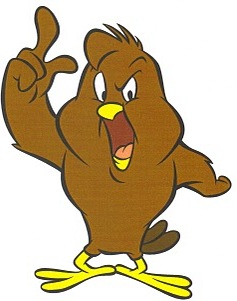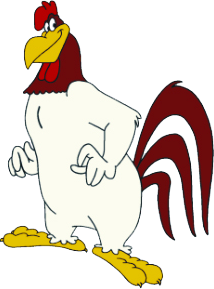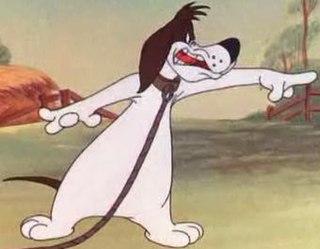
Henery Hawk is an American cartoon character who appears in twelve comedy film shorts produced in the Looney Tunes and Merrie Melodies series. His first appearance is in the 1942 theatrical release The Squawkin' Hawk, which was directed by Chuck Jones and produced by Leon Schlesinger. Henery's second screen appearance, one directed by Robert McKimson, is in Walky Talky Hawky (1946), which also features the characters Foghorn Leghorn and Barnyard Dawg in their first cartoon roles. The last Warner Brothers theatrical short to showcase the little chickenhawk is the 1961 release Strangled Eggs in which he co-stars again with Foghorn Leghorn as well as with another popular character of that period, Miss Prissy. Following that production, Henery continued to be seen periodically in other animated presentations such as The Looney Tunes Show and Looney Tunes Cartoons.
Egghead Jr. is a character in the animated cartoon Looney Tunes, created by Robert McKimson in the 1950s. He debuted in 1954's Little Boy Boo, and made two subsequent Looney Tunes appearances in 1955's Feather Dusted and 1960s Crockett-Doodle-Doo.

The Foghorn Leghorn is a 1948 Warner Bros. Merrie Melodies cartoon directed by Robert McKimson. The cartoon was released on October 9, 1948, and features Foghorn Leghorn, Henery Hawk and the Barnyard Dawg.

Foghorn Leghorn is a cartoon rooster who appears in Looney Tunes and Merrie Melodies cartoons and films from Warner Bros. Animation. He was created by Robert McKimson, and starred in 29 cartoons from 1946 to 1964 in the golden age of American animation. All 29 of these cartoons were directed by McKimson.

Crowing Pains is a 1947 Warner Bros. Looney Tunes cartoon directed by Robert McKimson. The cartoon was released on July 12, 1947, and stars Henery Hawk, Sylvester, Foghorn Leghorn and the Barnyard Dawg. This is McKimson's first short to feature Sylvester.

Barnyard Dawg is a Looney Tunes character. A feisty anthropomorphic basset hound, he is a friend and the archenemy of Foghorn Leghorn. He was created by Robert McKimson, who also created Foghorn, and was voiced by Mel Blanc. Dawg also feuds with other enemies as well like Henery Hawk, Daffy Duck and Sylvester. He appeared in 23 Golden Age–era Warner Bros. shorts.
Mother Was a Rooster is a 1962 Warner Bros. Merrie Melodies animated short directed by Robert McKimson. The cartoon was released on October 20, 1962, and features Foghorn Leghorn and the Barnyard Dawg. The voices are performed by Mel Blanc. It is the last-released cartoon scored by Milt Franklyn; Bill Lava would take over as composer for Looney Tunes cartoons starting with Good Noose until the cartoon department's closure in 1969.
Strangled Eggs is a Warner Bros. Merrie Melodies cartoon short directed by Robert McKimson. The cartoon was released on March 18, 1961, and features Foghorn Leghorn, Henery Hawk and Miss Prissy. The voices are performed by Mel Blanc. This was the only cartoon to star both Miss Prissy and Henery Hawk.
The Dixie Fryer is a 1960 Warner Bros. Looney Tunes cartoon short directed by Robert McKimson. The cartoon was released on September 24, 1960, and features Foghorn Leghorn.
Sock-A-Doodle-Do is a 1952 Warner Bros. Looney Tunes animated short directed by Robert McKimson. The cartoon was released on May 10, 1952, and features Foghorn Leghorn and the Barnyard Dawg. The voices are performed by Mel Blanc, though Banty was voiced by an uncredited Sheldon Leonard.
Feather Bluster is a 1958 Warner Bros. Merrie Melodies animated short directed by Robert McKimson. The cartoon was released on May 10, 1958, and features Foghorn Leghorn and the Barnyard Dawg.
The Leghorn Blows at Midnight is a 1950 Warner Bros. Looney Tunes cartoon directed by Robert McKimson. The cartoon was released on May 6, 1950, and features Foghorn Leghorn, Henery Hawk and the Barnyard Dawg.
Henhouse Henery is a 1949 Warner Bros. Looney Tunes theatrical short directed by Robert McKimson. The cartoon was released on July 2, 1949, and features Foghorn Leghorn, Henery Hawk and the Barnyard Dawg.
Leghorn Swoggled is a 1951 Warner Bros. Merrie Melodies cartoon directed by Robert McKimson. It is story by Warren Foster. The cartoon was released on July 28, 1951, and features Foghorn Leghorn, Henery Hawk and the Barnyard Dawg. The cartoon's plot is similar to Henhouse Henery (1949) and The Leghorn Blows at Midnight (1950).
Lovelorn Leghorn is a 1951 Warner Bros. Looney Tunes cartoon directed by Robert McKimson. The cartoon was released on September 8, 1951, and features Foghorn Leghorn, Miss Prissy and the Barnyard Dawg.
The EGGcited Rooster is a 1952 Warner Bros. Merrie Melodies cartoon directed by Robert McKimson. The cartoon was released on October 4, 1952, and features Foghorn Leghorn, Henery Hawk and the Barnyard Dawg.
Plop Goes the Weasel! is a 1953 Warner Bros. Looney Tunes cartoon, directed by Robert McKimson and produced by Edward Selzer. The cartoon was released on August 22, 1953, and features Foghorn Leghorn and the Barnyard Dawg.
All Fowled Up is a 1955 Warner Bros. Looney Tunes animated short film directed by Robert McKimson. The cartoon was released on February 19, 1955, and features Foghorn Leghorn, Henery Hawk and the Barnyard Dawg.
Weasel Stop is a 1956 Warner Bros. Looney Tunes animated short film directed by Robert McKimson. The cartoon was released on February 11, 1956, and features Foghorn Leghorn.

Fox-Terror is a 1957 Warner Bros. Merrie Melodies animated short directed by Robert McKimson. The cartoon was released on May 11, 1957, and features Foghorn Leghorn and the Barnyard Dawg. The title is a play on the dog breed name "Fox Terrier."






